Essay on Human Resource Management, Ethics, CSR, and Business Practice
VerifiedAdded on 2022/09/11
|8
|2099
|18
Essay
AI Summary
This essay delves into the intricate relationship between Human Resource Management (HRM), organizational ethics, Corporate Social Responsibility (CSR), and responsible business practices. It begins by defining HRM and its role in managing and developing employees. The essay then explores the impact of organizational ethics on the workforce, highlighting how it fosters trust and encourages ethical behavior. Corporate Social Responsibility (CSR) is examined as a strategic commitment to meet stakeholder needs and preserve the environment. The concept of responsible business practice is discussed, emphasizing value creation for stakeholders and adherence to socio-cultural standards. The essay then focuses on how HRM policies, such as implementing green practices, embracing eco-friendly training, and utilizing Human Resources Information Systems (HRIS), can promote responsible business practices. It emphasizes the importance of aligning HRM policies with environmental standards and fostering a sustainability mindset within the leadership. The conclusion reiterates the significance of ethical obligations, CSR, and the role of HRM in achieving organizational objectives while adhering to legal and environmental frameworks. The essay provides a comprehensive overview of the topic, offering valuable insights into how businesses can integrate ethical and sustainable practices through effective HRM policies.
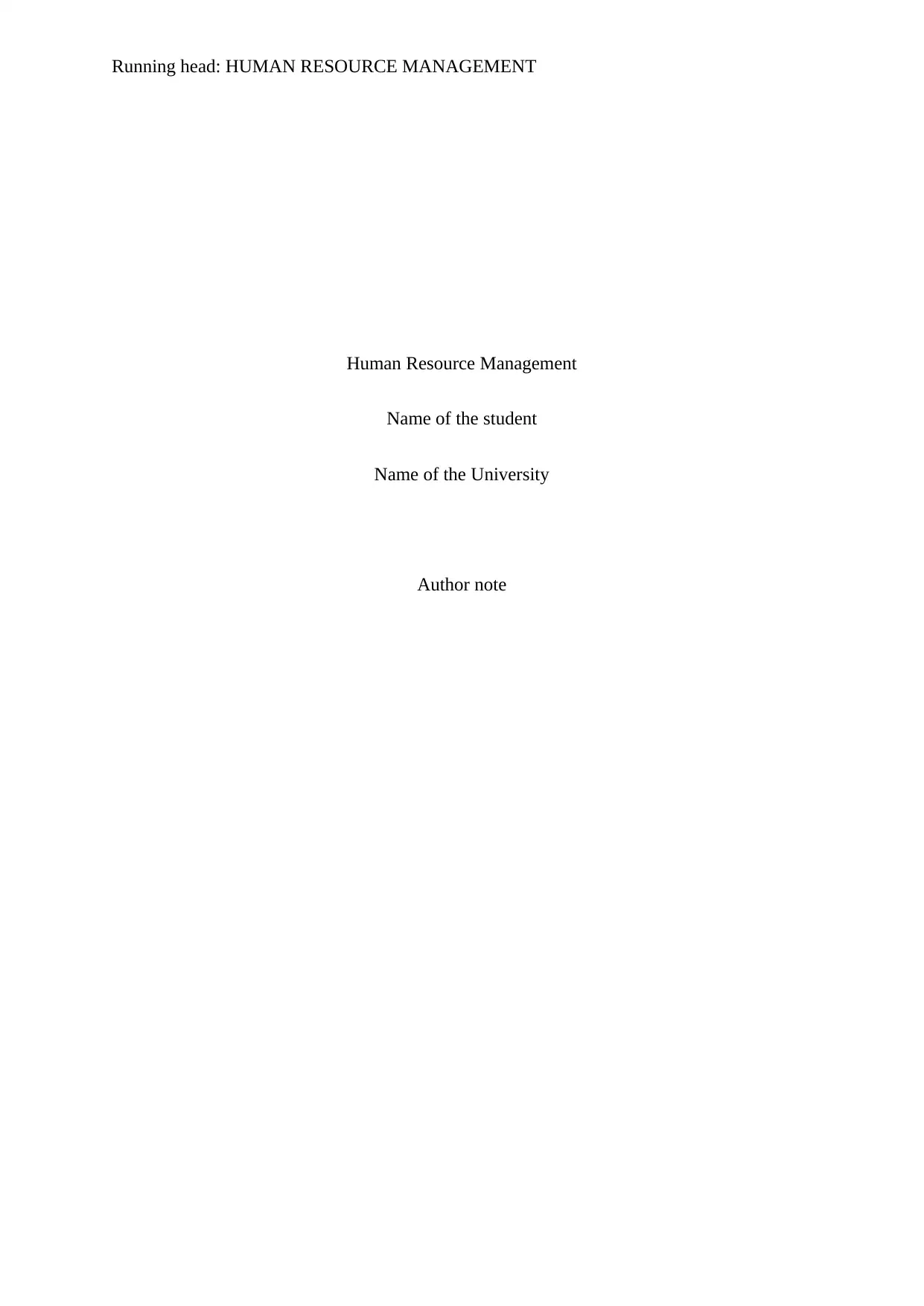
Running head: HUMAN RESOURCE MANAGEMENT
Human Resource Management
Name of the student
Name of the University
Author note
Human Resource Management
Name of the student
Name of the University
Author note
Paraphrase This Document
Need a fresh take? Get an instant paraphrase of this document with our AI Paraphraser
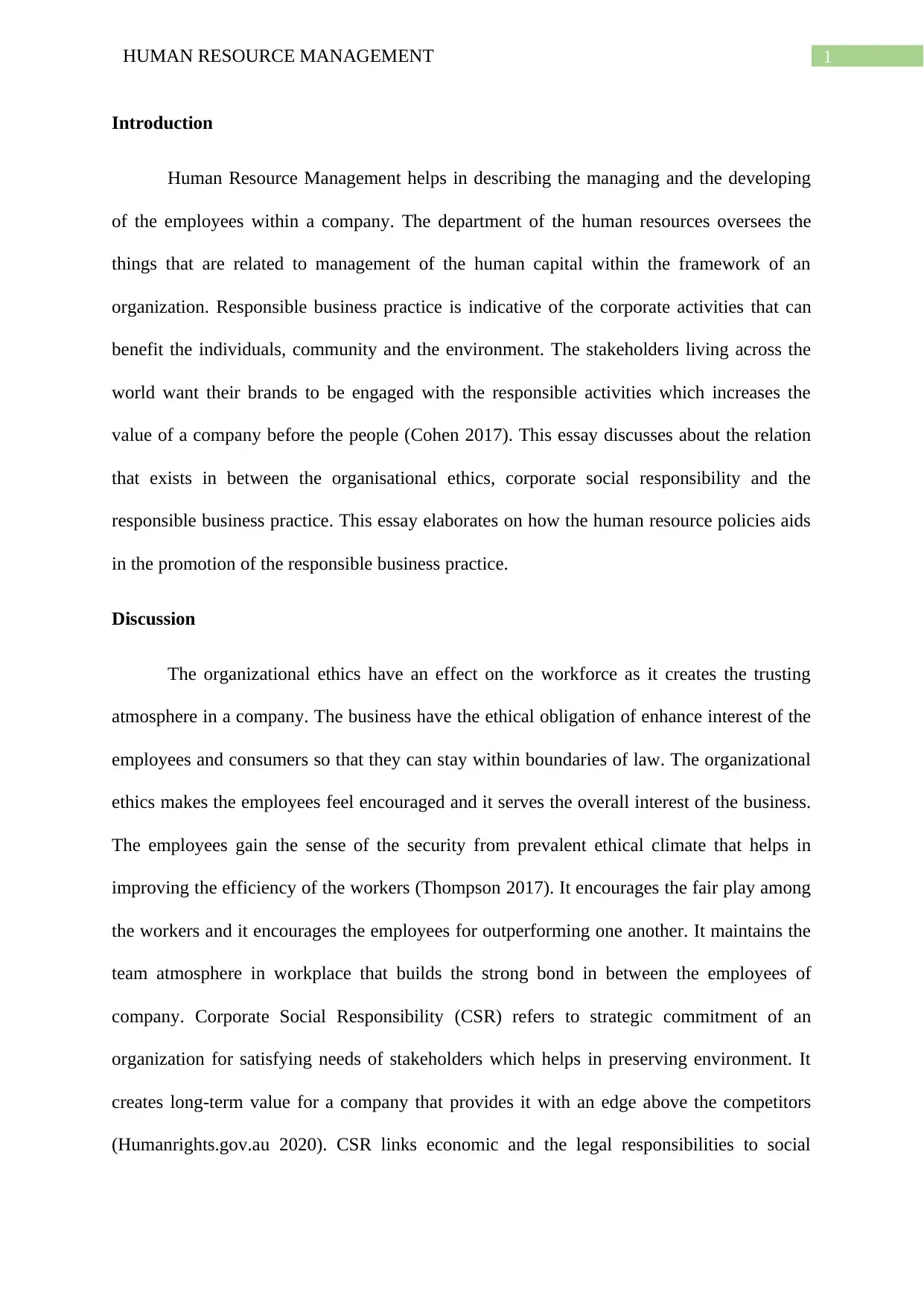
1HUMAN RESOURCE MANAGEMENT
Introduction
Human Resource Management helps in describing the managing and the developing
of the employees within a company. The department of the human resources oversees the
things that are related to management of the human capital within the framework of an
organization. Responsible business practice is indicative of the corporate activities that can
benefit the individuals, community and the environment. The stakeholders living across the
world want their brands to be engaged with the responsible activities which increases the
value of a company before the people (Cohen 2017). This essay discusses about the relation
that exists in between the organisational ethics, corporate social responsibility and the
responsible business practice. This essay elaborates on how the human resource policies aids
in the promotion of the responsible business practice.
Discussion
The organizational ethics have an effect on the workforce as it creates the trusting
atmosphere in a company. The business have the ethical obligation of enhance interest of the
employees and consumers so that they can stay within boundaries of law. The organizational
ethics makes the employees feel encouraged and it serves the overall interest of the business.
The employees gain the sense of the security from prevalent ethical climate that helps in
improving the efficiency of the workers (Thompson 2017). It encourages the fair play among
the workers and it encourages the employees for outperforming one another. It maintains the
team atmosphere in workplace that builds the strong bond in between the employees of
company. Corporate Social Responsibility (CSR) refers to strategic commitment of an
organization for satisfying needs of stakeholders which helps in preserving environment. It
creates long-term value for a company that provides it with an edge above the competitors
(Humanrights.gov.au 2020). CSR links economic and the legal responsibilities to social
Introduction
Human Resource Management helps in describing the managing and the developing
of the employees within a company. The department of the human resources oversees the
things that are related to management of the human capital within the framework of an
organization. Responsible business practice is indicative of the corporate activities that can
benefit the individuals, community and the environment. The stakeholders living across the
world want their brands to be engaged with the responsible activities which increases the
value of a company before the people (Cohen 2017). This essay discusses about the relation
that exists in between the organisational ethics, corporate social responsibility and the
responsible business practice. This essay elaborates on how the human resource policies aids
in the promotion of the responsible business practice.
Discussion
The organizational ethics have an effect on the workforce as it creates the trusting
atmosphere in a company. The business have the ethical obligation of enhance interest of the
employees and consumers so that they can stay within boundaries of law. The organizational
ethics makes the employees feel encouraged and it serves the overall interest of the business.
The employees gain the sense of the security from prevalent ethical climate that helps in
improving the efficiency of the workers (Thompson 2017). It encourages the fair play among
the workers and it encourages the employees for outperforming one another. It maintains the
team atmosphere in workplace that builds the strong bond in between the employees of
company. Corporate Social Responsibility (CSR) refers to strategic commitment of an
organization for satisfying needs of stakeholders which helps in preserving environment. It
creates long-term value for a company that provides it with an edge above the competitors
(Humanrights.gov.au 2020). CSR links economic and the legal responsibilities to social
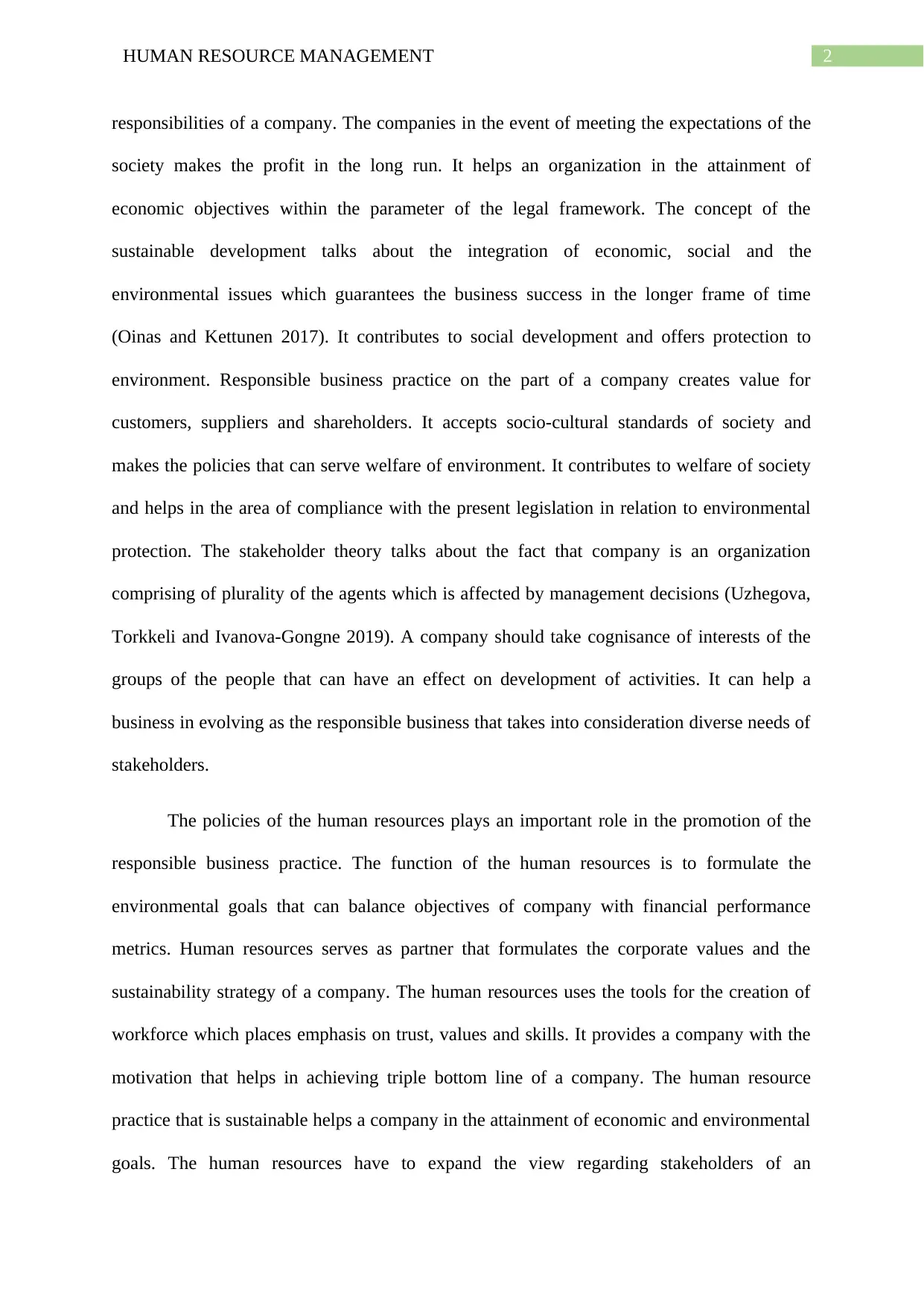
2HUMAN RESOURCE MANAGEMENT
responsibilities of a company. The companies in the event of meeting the expectations of the
society makes the profit in the long run. It helps an organization in the attainment of
economic objectives within the parameter of the legal framework. The concept of the
sustainable development talks about the integration of economic, social and the
environmental issues which guarantees the business success in the longer frame of time
(Oinas and Kettunen 2017). It contributes to social development and offers protection to
environment. Responsible business practice on the part of a company creates value for
customers, suppliers and shareholders. It accepts socio-cultural standards of society and
makes the policies that can serve welfare of environment. It contributes to welfare of society
and helps in the area of compliance with the present legislation in relation to environmental
protection. The stakeholder theory talks about the fact that company is an organization
comprising of plurality of the agents which is affected by management decisions (Uzhegova,
Torkkeli and Ivanova-Gongne 2019). A company should take cognisance of interests of the
groups of the people that can have an effect on development of activities. It can help a
business in evolving as the responsible business that takes into consideration diverse needs of
stakeholders.
The policies of the human resources plays an important role in the promotion of the
responsible business practice. The function of the human resources is to formulate the
environmental goals that can balance objectives of company with financial performance
metrics. Human resources serves as partner that formulates the corporate values and the
sustainability strategy of a company. The human resources uses the tools for the creation of
workforce which places emphasis on trust, values and skills. It provides a company with the
motivation that helps in achieving triple bottom line of a company. The human resource
practice that is sustainable helps a company in the attainment of economic and environmental
goals. The human resources have to expand the view regarding stakeholders of an
responsibilities of a company. The companies in the event of meeting the expectations of the
society makes the profit in the long run. It helps an organization in the attainment of
economic objectives within the parameter of the legal framework. The concept of the
sustainable development talks about the integration of economic, social and the
environmental issues which guarantees the business success in the longer frame of time
(Oinas and Kettunen 2017). It contributes to social development and offers protection to
environment. Responsible business practice on the part of a company creates value for
customers, suppliers and shareholders. It accepts socio-cultural standards of society and
makes the policies that can serve welfare of environment. It contributes to welfare of society
and helps in the area of compliance with the present legislation in relation to environmental
protection. The stakeholder theory talks about the fact that company is an organization
comprising of plurality of the agents which is affected by management decisions (Uzhegova,
Torkkeli and Ivanova-Gongne 2019). A company should take cognisance of interests of the
groups of the people that can have an effect on development of activities. It can help a
business in evolving as the responsible business that takes into consideration diverse needs of
stakeholders.
The policies of the human resources plays an important role in the promotion of the
responsible business practice. The function of the human resources is to formulate the
environmental goals that can balance objectives of company with financial performance
metrics. Human resources serves as partner that formulates the corporate values and the
sustainability strategy of a company. The human resources uses the tools for the creation of
workforce which places emphasis on trust, values and skills. It provides a company with the
motivation that helps in achieving triple bottom line of a company. The human resource
practice that is sustainable helps a company in the attainment of economic and environmental
goals. The human resources have to expand the view regarding stakeholders of an
⊘ This is a preview!⊘
Do you want full access?
Subscribe today to unlock all pages.

Trusted by 1+ million students worldwide
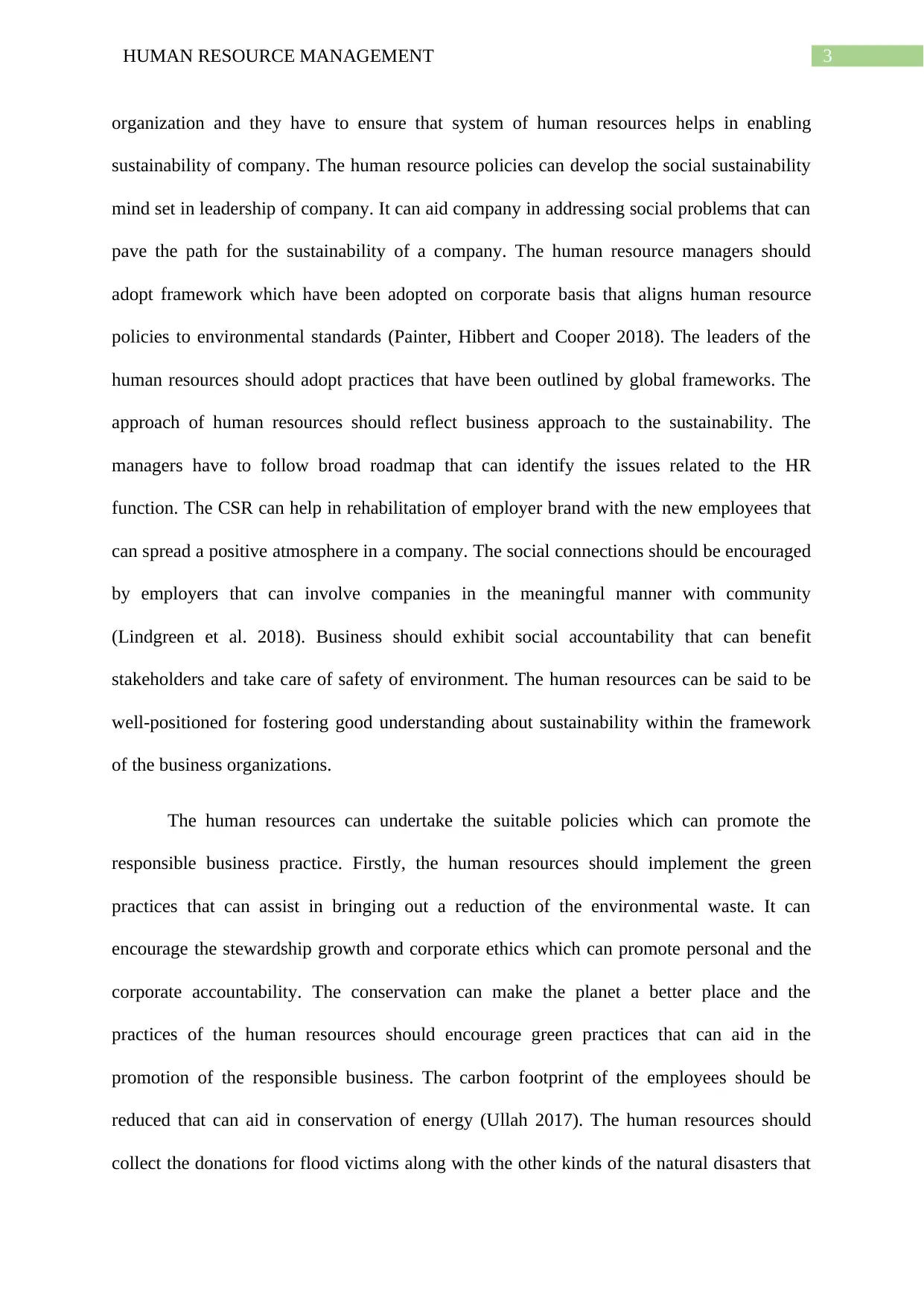
3HUMAN RESOURCE MANAGEMENT
organization and they have to ensure that system of human resources helps in enabling
sustainability of company. The human resource policies can develop the social sustainability
mind set in leadership of company. It can aid company in addressing social problems that can
pave the path for the sustainability of a company. The human resource managers should
adopt framework which have been adopted on corporate basis that aligns human resource
policies to environmental standards (Painter, Hibbert and Cooper 2018). The leaders of the
human resources should adopt practices that have been outlined by global frameworks. The
approach of human resources should reflect business approach to the sustainability. The
managers have to follow broad roadmap that can identify the issues related to the HR
function. The CSR can help in rehabilitation of employer brand with the new employees that
can spread a positive atmosphere in a company. The social connections should be encouraged
by employers that can involve companies in the meaningful manner with community
(Lindgreen et al. 2018). Business should exhibit social accountability that can benefit
stakeholders and take care of safety of environment. The human resources can be said to be
well-positioned for fostering good understanding about sustainability within the framework
of the business organizations.
The human resources can undertake the suitable policies which can promote the
responsible business practice. Firstly, the human resources should implement the green
practices that can assist in bringing out a reduction of the environmental waste. It can
encourage the stewardship growth and corporate ethics which can promote personal and the
corporate accountability. The conservation can make the planet a better place and the
practices of the human resources should encourage green practices that can aid in the
promotion of the responsible business. The carbon footprint of the employees should be
reduced that can aid in conservation of energy (Ullah 2017). The human resources should
collect the donations for flood victims along with the other kinds of the natural disasters that
organization and they have to ensure that system of human resources helps in enabling
sustainability of company. The human resource policies can develop the social sustainability
mind set in leadership of company. It can aid company in addressing social problems that can
pave the path for the sustainability of a company. The human resource managers should
adopt framework which have been adopted on corporate basis that aligns human resource
policies to environmental standards (Painter, Hibbert and Cooper 2018). The leaders of the
human resources should adopt practices that have been outlined by global frameworks. The
approach of human resources should reflect business approach to the sustainability. The
managers have to follow broad roadmap that can identify the issues related to the HR
function. The CSR can help in rehabilitation of employer brand with the new employees that
can spread a positive atmosphere in a company. The social connections should be encouraged
by employers that can involve companies in the meaningful manner with community
(Lindgreen et al. 2018). Business should exhibit social accountability that can benefit
stakeholders and take care of safety of environment. The human resources can be said to be
well-positioned for fostering good understanding about sustainability within the framework
of the business organizations.
The human resources can undertake the suitable policies which can promote the
responsible business practice. Firstly, the human resources should implement the green
practices that can assist in bringing out a reduction of the environmental waste. It can
encourage the stewardship growth and corporate ethics which can promote personal and the
corporate accountability. The conservation can make the planet a better place and the
practices of the human resources should encourage green practices that can aid in the
promotion of the responsible business. The carbon footprint of the employees should be
reduced that can aid in conservation of energy (Ullah 2017). The human resources should
collect the donations for flood victims along with the other kinds of the natural disasters that
Paraphrase This Document
Need a fresh take? Get an instant paraphrase of this document with our AI Paraphraser
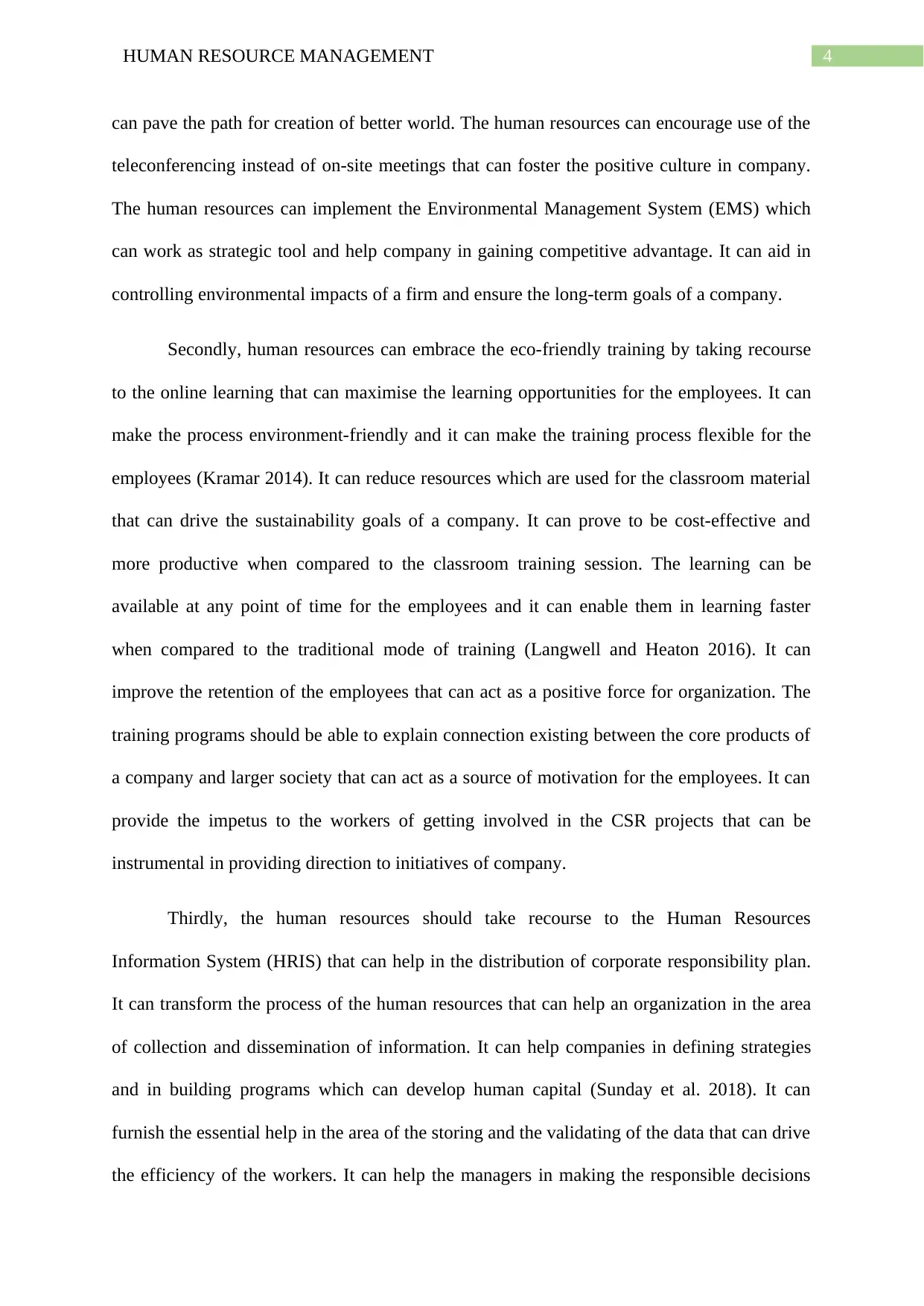
4HUMAN RESOURCE MANAGEMENT
can pave the path for creation of better world. The human resources can encourage use of the
teleconferencing instead of on-site meetings that can foster the positive culture in company.
The human resources can implement the Environmental Management System (EMS) which
can work as strategic tool and help company in gaining competitive advantage. It can aid in
controlling environmental impacts of a firm and ensure the long-term goals of a company.
Secondly, human resources can embrace the eco-friendly training by taking recourse
to the online learning that can maximise the learning opportunities for the employees. It can
make the process environment-friendly and it can make the training process flexible for the
employees (Kramar 2014). It can reduce resources which are used for the classroom material
that can drive the sustainability goals of a company. It can prove to be cost-effective and
more productive when compared to the classroom training session. The learning can be
available at any point of time for the employees and it can enable them in learning faster
when compared to the traditional mode of training (Langwell and Heaton 2016). It can
improve the retention of the employees that can act as a positive force for organization. The
training programs should be able to explain connection existing between the core products of
a company and larger society that can act as a source of motivation for the employees. It can
provide the impetus to the workers of getting involved in the CSR projects that can be
instrumental in providing direction to initiatives of company.
Thirdly, the human resources should take recourse to the Human Resources
Information System (HRIS) that can help in the distribution of corporate responsibility plan.
It can transform the process of the human resources that can help an organization in the area
of collection and dissemination of information. It can help companies in defining strategies
and in building programs which can develop human capital (Sunday et al. 2018). It can
furnish the essential help in the area of the storing and the validating of the data that can drive
the efficiency of the workers. It can help the managers in making the responsible decisions
can pave the path for creation of better world. The human resources can encourage use of the
teleconferencing instead of on-site meetings that can foster the positive culture in company.
The human resources can implement the Environmental Management System (EMS) which
can work as strategic tool and help company in gaining competitive advantage. It can aid in
controlling environmental impacts of a firm and ensure the long-term goals of a company.
Secondly, human resources can embrace the eco-friendly training by taking recourse
to the online learning that can maximise the learning opportunities for the employees. It can
make the process environment-friendly and it can make the training process flexible for the
employees (Kramar 2014). It can reduce resources which are used for the classroom material
that can drive the sustainability goals of a company. It can prove to be cost-effective and
more productive when compared to the classroom training session. The learning can be
available at any point of time for the employees and it can enable them in learning faster
when compared to the traditional mode of training (Langwell and Heaton 2016). It can
improve the retention of the employees that can act as a positive force for organization. The
training programs should be able to explain connection existing between the core products of
a company and larger society that can act as a source of motivation for the employees. It can
provide the impetus to the workers of getting involved in the CSR projects that can be
instrumental in providing direction to initiatives of company.
Thirdly, the human resources should take recourse to the Human Resources
Information System (HRIS) that can help in the distribution of corporate responsibility plan.
It can transform the process of the human resources that can help an organization in the area
of collection and dissemination of information. It can help companies in defining strategies
and in building programs which can develop human capital (Sunday et al. 2018). It can
furnish the essential help in the area of the storing and the validating of the data that can drive
the efficiency of the workers. It can help the managers in making the responsible decisions
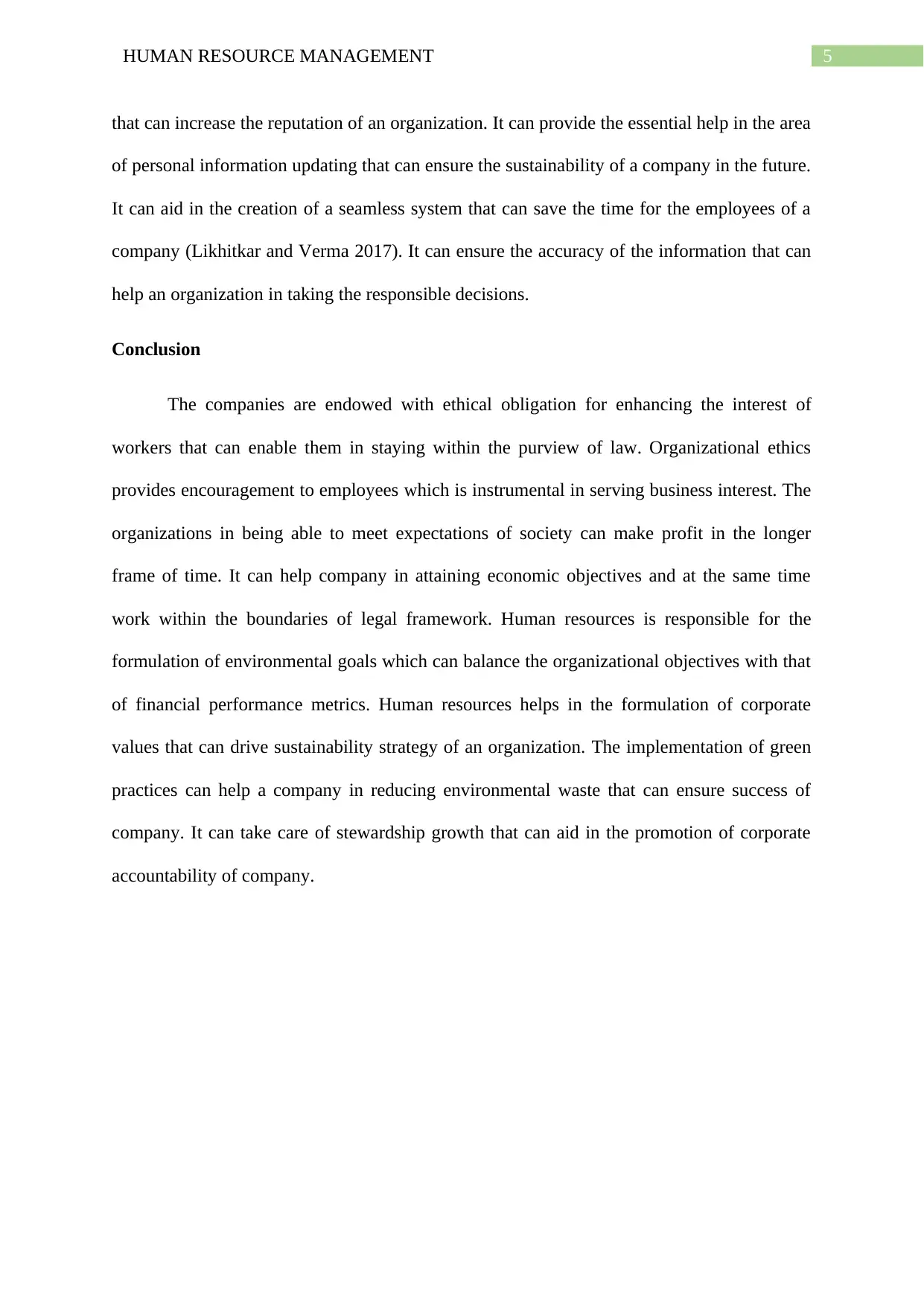
5HUMAN RESOURCE MANAGEMENT
that can increase the reputation of an organization. It can provide the essential help in the area
of personal information updating that can ensure the sustainability of a company in the future.
It can aid in the creation of a seamless system that can save the time for the employees of a
company (Likhitkar and Verma 2017). It can ensure the accuracy of the information that can
help an organization in taking the responsible decisions.
Conclusion
The companies are endowed with ethical obligation for enhancing the interest of
workers that can enable them in staying within the purview of law. Organizational ethics
provides encouragement to employees which is instrumental in serving business interest. The
organizations in being able to meet expectations of society can make profit in the longer
frame of time. It can help company in attaining economic objectives and at the same time
work within the boundaries of legal framework. Human resources is responsible for the
formulation of environmental goals which can balance the organizational objectives with that
of financial performance metrics. Human resources helps in the formulation of corporate
values that can drive sustainability strategy of an organization. The implementation of green
practices can help a company in reducing environmental waste that can ensure success of
company. It can take care of stewardship growth that can aid in the promotion of corporate
accountability of company.
that can increase the reputation of an organization. It can provide the essential help in the area
of personal information updating that can ensure the sustainability of a company in the future.
It can aid in the creation of a seamless system that can save the time for the employees of a
company (Likhitkar and Verma 2017). It can ensure the accuracy of the information that can
help an organization in taking the responsible decisions.
Conclusion
The companies are endowed with ethical obligation for enhancing the interest of
workers that can enable them in staying within the purview of law. Organizational ethics
provides encouragement to employees which is instrumental in serving business interest. The
organizations in being able to meet expectations of society can make profit in the longer
frame of time. It can help company in attaining economic objectives and at the same time
work within the boundaries of legal framework. Human resources is responsible for the
formulation of environmental goals which can balance the organizational objectives with that
of financial performance metrics. Human resources helps in the formulation of corporate
values that can drive sustainability strategy of an organization. The implementation of green
practices can help a company in reducing environmental waste that can ensure success of
company. It can take care of stewardship growth that can aid in the promotion of corporate
accountability of company.
⊘ This is a preview!⊘
Do you want full access?
Subscribe today to unlock all pages.

Trusted by 1+ million students worldwide
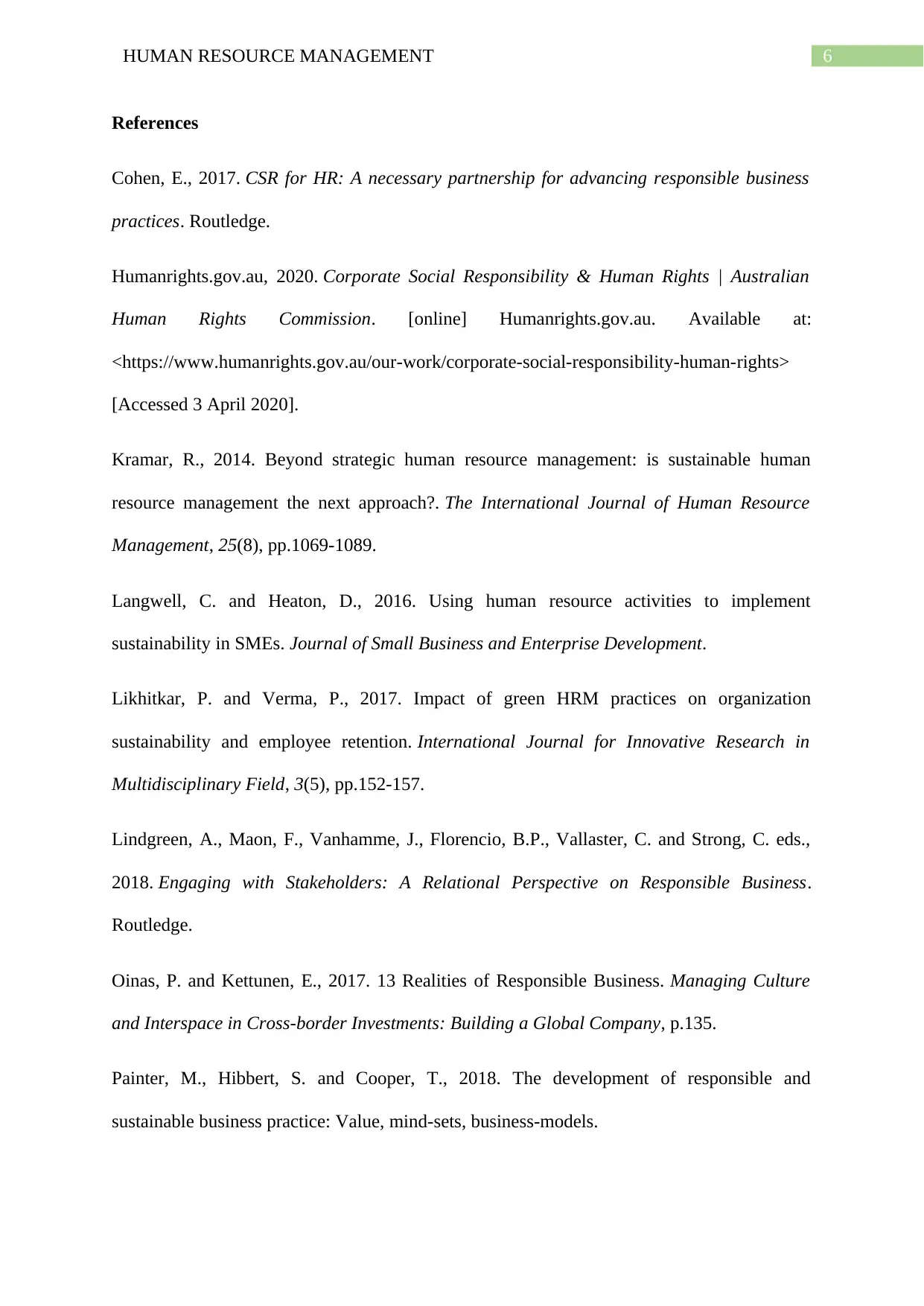
6HUMAN RESOURCE MANAGEMENT
References
Cohen, E., 2017. CSR for HR: A necessary partnership for advancing responsible business
practices. Routledge.
Humanrights.gov.au, 2020. Corporate Social Responsibility & Human Rights | Australian
Human Rights Commission. [online] Humanrights.gov.au. Available at:
<https://www.humanrights.gov.au/our-work/corporate-social-responsibility-human-rights>
[Accessed 3 April 2020].
Kramar, R., 2014. Beyond strategic human resource management: is sustainable human
resource management the next approach?. The International Journal of Human Resource
Management, 25(8), pp.1069-1089.
Langwell, C. and Heaton, D., 2016. Using human resource activities to implement
sustainability in SMEs. Journal of Small Business and Enterprise Development.
Likhitkar, P. and Verma, P., 2017. Impact of green HRM practices on organization
sustainability and employee retention. International Journal for Innovative Research in
Multidisciplinary Field, 3(5), pp.152-157.
Lindgreen, A., Maon, F., Vanhamme, J., Florencio, B.P., Vallaster, C. and Strong, C. eds.,
2018. Engaging with Stakeholders: A Relational Perspective on Responsible Business.
Routledge.
Oinas, P. and Kettunen, E., 2017. 13 Realities of Responsible Business. Managing Culture
and Interspace in Cross-border Investments: Building a Global Company, p.135.
Painter, M., Hibbert, S. and Cooper, T., 2018. The development of responsible and
sustainable business practice: Value, mind-sets, business-models.
References
Cohen, E., 2017. CSR for HR: A necessary partnership for advancing responsible business
practices. Routledge.
Humanrights.gov.au, 2020. Corporate Social Responsibility & Human Rights | Australian
Human Rights Commission. [online] Humanrights.gov.au. Available at:
<https://www.humanrights.gov.au/our-work/corporate-social-responsibility-human-rights>
[Accessed 3 April 2020].
Kramar, R., 2014. Beyond strategic human resource management: is sustainable human
resource management the next approach?. The International Journal of Human Resource
Management, 25(8), pp.1069-1089.
Langwell, C. and Heaton, D., 2016. Using human resource activities to implement
sustainability in SMEs. Journal of Small Business and Enterprise Development.
Likhitkar, P. and Verma, P., 2017. Impact of green HRM practices on organization
sustainability and employee retention. International Journal for Innovative Research in
Multidisciplinary Field, 3(5), pp.152-157.
Lindgreen, A., Maon, F., Vanhamme, J., Florencio, B.P., Vallaster, C. and Strong, C. eds.,
2018. Engaging with Stakeholders: A Relational Perspective on Responsible Business.
Routledge.
Oinas, P. and Kettunen, E., 2017. 13 Realities of Responsible Business. Managing Culture
and Interspace in Cross-border Investments: Building a Global Company, p.135.
Painter, M., Hibbert, S. and Cooper, T., 2018. The development of responsible and
sustainable business practice: Value, mind-sets, business-models.
Paraphrase This Document
Need a fresh take? Get an instant paraphrase of this document with our AI Paraphraser
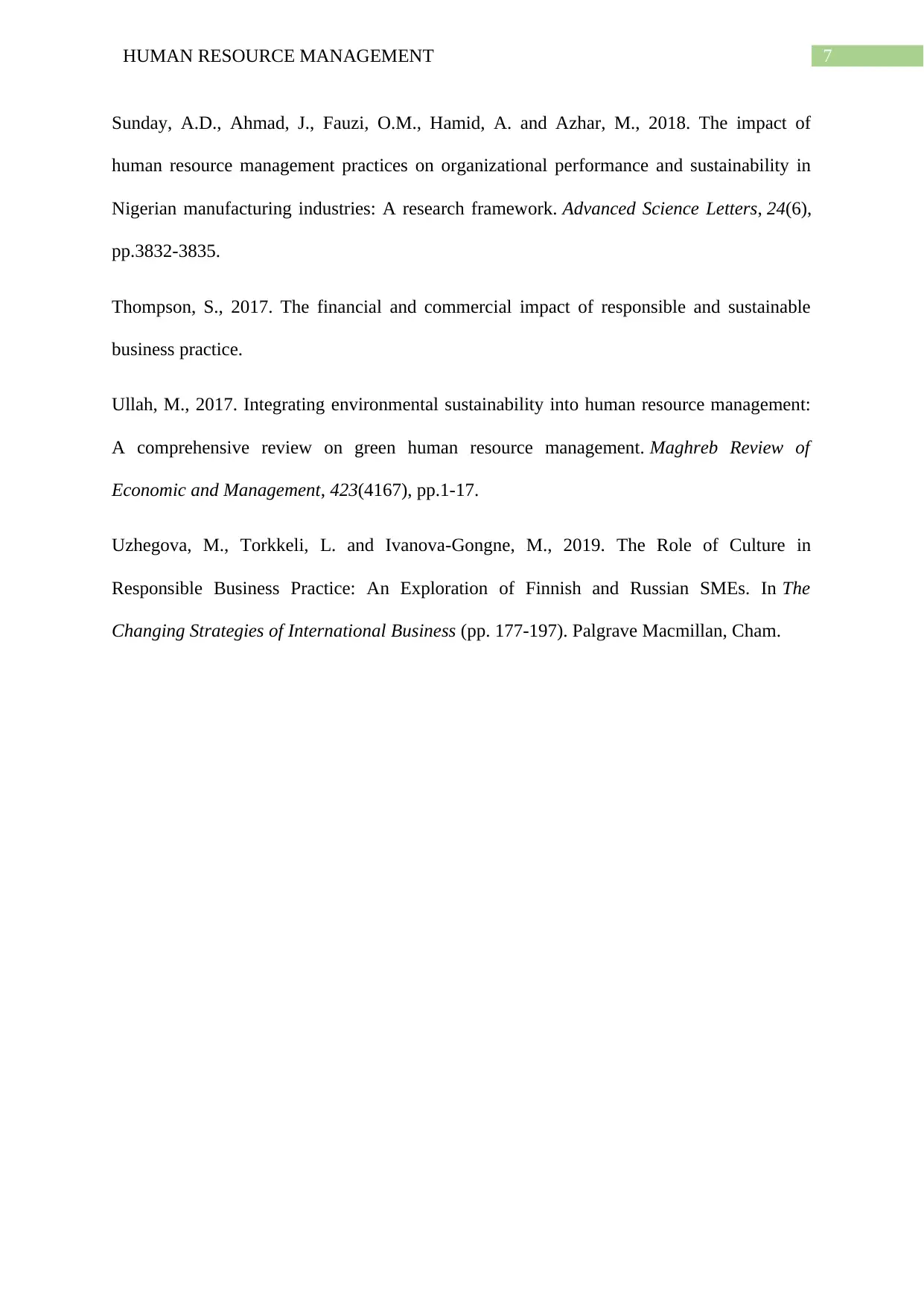
7HUMAN RESOURCE MANAGEMENT
Sunday, A.D., Ahmad, J., Fauzi, O.M., Hamid, A. and Azhar, M., 2018. The impact of
human resource management practices on organizational performance and sustainability in
Nigerian manufacturing industries: A research framework. Advanced Science Letters, 24(6),
pp.3832-3835.
Thompson, S., 2017. The financial and commercial impact of responsible and sustainable
business practice.
Ullah, M., 2017. Integrating environmental sustainability into human resource management:
A comprehensive review on green human resource management. Maghreb Review of
Economic and Management, 423(4167), pp.1-17.
Uzhegova, M., Torkkeli, L. and Ivanova-Gongne, M., 2019. The Role of Culture in
Responsible Business Practice: An Exploration of Finnish and Russian SMEs. In The
Changing Strategies of International Business (pp. 177-197). Palgrave Macmillan, Cham.
Sunday, A.D., Ahmad, J., Fauzi, O.M., Hamid, A. and Azhar, M., 2018. The impact of
human resource management practices on organizational performance and sustainability in
Nigerian manufacturing industries: A research framework. Advanced Science Letters, 24(6),
pp.3832-3835.
Thompson, S., 2017. The financial and commercial impact of responsible and sustainable
business practice.
Ullah, M., 2017. Integrating environmental sustainability into human resource management:
A comprehensive review on green human resource management. Maghreb Review of
Economic and Management, 423(4167), pp.1-17.
Uzhegova, M., Torkkeli, L. and Ivanova-Gongne, M., 2019. The Role of Culture in
Responsible Business Practice: An Exploration of Finnish and Russian SMEs. In The
Changing Strategies of International Business (pp. 177-197). Palgrave Macmillan, Cham.
1 out of 8
Related Documents
Your All-in-One AI-Powered Toolkit for Academic Success.
+13062052269
info@desklib.com
Available 24*7 on WhatsApp / Email
![[object Object]](/_next/static/media/star-bottom.7253800d.svg)
Unlock your academic potential
Copyright © 2020–2026 A2Z Services. All Rights Reserved. Developed and managed by ZUCOL.




